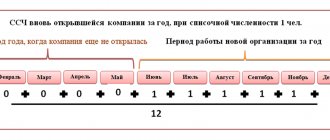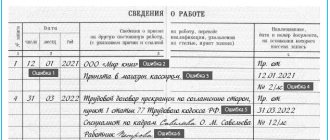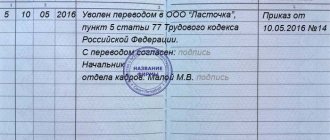You will learn:
Which employees will have to be suspended from work
? Who has the right to do this?
What to consider when drawing up a removal order
Is there a legal alternative to suspension?
What are the consequences of suspension for the employee and the employer?
Since vaccination against COVID-19 is included in the all-Russian vaccination calendar, the leadership of a number of constituent entities of the Russian Federation obliged heads of areas of activity to remove employees who did not get vaccinated.
Grounds and reasons
Article 76 of the Labor Code of the Russian Federation lists situations in which an employee is necessarily suspended from work:
state of intoxication (drug, alcohol, toxic);- the employee has not undergone training and knowledge testing on labor protection;
- lack of medical examination results;
- medical contraindications for performing work;
- suspension of a special permit or employee's right;
- requirement of authorized government bodies or officials (labor inspectorate, court, etc.);
- other cases mentioned in the current legislation.
ONCE AGAIN ABOUT NORMATIVE JUSTIFICATION
The competent departments have already issued letters in which they substantiate the legality of removing unvaccinated workers from work in some areas of activity using norms from various regulatory legal acts (NLA). The main conclusions are:
• in the letter of Rostrud dated July 13, 2021 No. 1811-TZ (hereinafter referred to as letter of Rostrud No. 1811-TZ);
• letter of the Ministry of Labor of Russia dated July 23, 2021 No. 14-4/10/P-5532 “On sending clarifications from the Ministry of Labor of Russia and Rospotrebnadzor on the organization of vaccination in organized work collectives (work collectives) and the procedure for recording the percentage of vaccinated people” with recommendations for actions for employers (hereinafter — Joint explanations).
In short, the logic is as follows:
| Rule of law | Normative act |
| Vaccination against coronavirus is included in the calendar of preventive vaccinations for epidemic indications | Order of the Ministry of Health of Russia dated December 9, 2020 No. 1307n “On introducing changes to the calendar of preventive vaccinations for epidemic indications, approved by order of the Ministry of Health of the Russian Federation dated March 21, 2014 No. 125n”; – Appendix No. 2 to the Order of the Ministry of Health of Russia dated March 21, 2014 No. 125n “On approval of the national calendar of preventive vaccinations and the calendar of preventive vaccinations for epidemic indications”* |
| Decisions on carrying out preventive vaccinations for epidemic indications are made by the chief state sanitary doctor of the Russian Federation and the chief state sanitary doctors of the constituent entities of the Russian Federation | Article 10 of the Federal Law of September 17, 1998 No. 157-FZ “On Immunoprophylaxis of Infectious Diseases” (as amended on June 11, 2021)** |
| In accordance with the resolutions of the chief state sanitary doctors in the constituent entities of the Russian Federation, employers are required to organize preventive vaccinations against coronavirus infection for their employees | Resolutions of the chief state sanitary doctors of more than 40 constituent entities of the Russian Federation*** |
| The employer is obliged to suspend (not allow to work) the employee […] in other cases provided for by […] other federal laws […] of the Russian Federation | Part 1 art. 76 Labor Code of the Russian Federation |
| The absence of preventive vaccinations entails: […] refusal to hire citizens for work or removal of citizens from work, the performance of which is associated with a high risk of contracting infectious diseases. Clause 2 of Art. 5 of Federal Law No. 157-FZ | Clause 2 of Art. 5 of Federal Law No. 157-FZ |
* Next - Order No. 125n. ** Next - Federal Law No. 157-FZ. *** The list of resolutions is here: https://clck.ru/WjL8o.
According to officials, clause 2 of Art. 5 of the Federal Law of September 17, 1998 No. 157-FZ “On the Immunoprophylaxis of Infectious Diseases” (as amended on June 11, 2021; hereinafter referred to as Federal Law No. 157-FZ) - this is the “case provided for by other federal laws of the Russian Federation” which obliges the employer to suspend employees from work.
This chain of acts, at first glance, seems quite logical. But lawyers, understanding the intricacies of legislative norms, see a big gap in this logic. Three points cause misunderstanding:
Why, referring to paragraph 2 of Art. 5 of Federal Law No. 157-FZ, did officials choose to quote only part of the norm?
Indeed, in addition to the phrase about removal[1], the same paragraph contains a continuation:
Extract from Federal Law No. 157-FZ
Article 5. Rights and obligations of citizens when carrying out immunoprophylaxis
[…]
2. Lack of preventive vaccinations entails:
[…]
The list of works, the performance of which is associated with a high risk of contracting infectious diseases and requires mandatory preventive vaccinations, is established by the federal executive body authorized by the Government of the Russian Federation.
[…]
That is, not everyone is subject to the debarment rule, but only persons who perform work associated with a high risk of contracting infectious diseases. And these works are indicated in a special List[2], which does not include salespeople, electricians, or janitors.
Where did the categories of workers who appear in the decrees of the chief sanitary doctors of the regions come from? From the column “Categories of citizens subject to mandatory vaccination” of the Calendar of Preventive Vaccinations for Epidemic Indications[3]. Being on the list gives you the right to receive the appropriate vaccination free of charge[4].
Why is the responsibility to require the employee to refuse vaccination shifted to the employer?
No law, including the Labor Code of the Russian Federation, establishes such an obligation. Vaccination is a type of medical intervention[5], therefore it can only be carried out with the consent of the citizen[6].
Citizens have the right to refuse preventive vaccinations[7]. Refusal to carry out medical intervention, including preventive vaccinations, is formalized in writing[8]. Informed voluntary consent to medical intervention, as well as refusal thereof, is a medical document that is signed not only by the patient, but also by the doctor[9].
Therefore, the employee is not required to provide a written refusal of vaccination to the employer - only to the doctor. The employer can only ask him to do this.
Why should an employer decide to suspend?
Among the powers of the chief state sanitary doctors are indicated[10] their rights to make reasoned decisions:
• on the temporary suspension from work of persons who are carriers of infectious disease agents and may be sources of the spread of infectious diseases due to the characteristics of the work or production they perform;
• carrying out preventive vaccinations for citizens or certain groups of citizens according to epidemic indications.
In the decrees issued to date, the chief sanitary doctors of the regions have used only one right: they have obliged employers to organize preventive vaccinations against coronavirus according to epidemic indications.
They did not take advantage of any other right. The regulations do not directly indicate the removal of workers who refuse mandatory vaccination against COVID-19. Therefore, the legality of removing workers from work until the corresponding clause is included in the Resolution of the Chief Sanitary Doctor is questionable.
Nevertheless, higher authorities and regulatory authorities force company managers, under pain of punishment (sanctions under Article 6.3 of the Code of Administrative Offenses of the Russian Federation), to remove unvaccinated workers from work.
We'll tell you how to do this as correctly as possible.
Whom do we remove from work?
In accordance with paragraph 2 of Art.
5 of Federal Law No. 157 of September 17, 1998 “On Immunoprophylaxis of Infectious Diseases”, the absence of preventive vaccinations entails refusal to hire or removal of citizens from work, the performance of which is associated with a high risk of contracting infectious diseases. The list of works, the performance of which is associated with a high risk of infectious diseases and requires mandatory preventive vaccinations, was approved by Decree of the Government of the Russian Federation of July 15, 1999 No. 825 (hereinafter referred to as the List).
If an organization operates in areas where vaccination is mandatory according to the List, the employer is obliged to remove from work an employee who refuses to be vaccinated.
In addition, if there is a threat of the emergence and spread of infectious diseases that pose a danger to others (including the new coronavirus infection), the chief state sanitary doctors of the constituent entities of the Russian Federation are empowered to issue reasoned decisions on carrying out preventive vaccinations for citizens or certain groups of citizens according to epidemic indications.
Thus, 60% of employees of Moscow organizations are required to get vaccinated - Decree of the Chief State Sanitary Doctor for the city of Moscow E.E. Andreeva dated June 15, 2021 No. 1 “On carrying out preventive vaccinations for certain groups of citizens for epidemic indications”, Decree of the Moscow Mayor dated June 16, 2021 No. 32-UM.
This applies to the following areas of activity:
- trade;
- beauty salons, cosmetics, spa salons, massage parlors, solariums, baths, saunas, fitness centers, fitness clubs, swimming pools;
- household services, including laundries, dry cleaning and other similar services;
- catering;
- client divisions of financial organizations, postal service organizations;
- MFC;
- public transport, taxi;
- education, health, social protection and social services;
- housing and communal services and energy;
- cultural, exhibition, educational events, including museums, exhibition halls, libraries, lectures, trainings (with the exception of official events organized by executive authorities);
- leisure, entertainment, entertainment events, including gaming events, master classes;
- children's playrooms, children's entertainment centers, children's day camps, other places where similar events are held for minors in buildings, structures, structures (premises in them), including in cultural and recreation parks, shopping and entertainment centers;
- theaters, cinemas, concert halls;
- mass physical education and sports events.
Mandatory vaccination also applies to civil servants, municipal employees, employees of Moscow city authorities and organizations subordinate to them.
Refusal to vaccinate for epidemic reasons will result in the removal from work of citizens who have not been vaccinated.
Read on topic:
Refusal of an employee to be vaccinated. What to do to avoid being fined?
WHICH EMPLOYEES SHOULD BE REMOVED
Now let’s move from the sphere of regulatory legal acts to the area of explanations from officials. Let us consider and analyze the Joint Explanations of the Ministry of Labor of Russia and Rospotrebnadzor mentioned at the beginning of the article and the letter of Rostrud No. 1811-TZ, as well as the responses of officials on the website Onlineinspektsiya.rf.
First of all, let's deal with percentages. The decrees of the chief sanitary doctors of the constituent entities of the Russian Federation indicate a specific percentage of company employees for whom vaccination must be provided. More often it is 60%, but you can find 65% (St. Petersburg), 70% (Yakutia), 80% (Leningrad region) and even 90% (Chechen Republic). In some regions, sanitary doctors did not indicate this percentage at all (Dagestan, Volgograd region), probably meaning that all workers should be vaccinated (i.e. 100%).
In the Joint Interpretation, officials showed how to calculate the percentage of workers already vaccinated. Using this information, we will derive a formula to determine the number of workers who need to be vaccinated (for 60%):
Who belongs to the remaining 40%? This information can also be obtained from the Joint Interpretations. Officials believe that in order to stabilize the situation with the incidence of COVID-19, it is necessary to ensure collective immunity at a level of at least 80% of the payroll. The distribution should be as follows:
That is, the 40% (those who may not have a vaccination certificate) can include the workers listed in the right column of the table. If there are none or less than 40%, the list for vaccination may not include workers who do not have direct contact with people, are not at high risk of infection and will not cause the spread of infection (for example, those working remotely and at home). The employer is given the right to independently determine who will be included in the list of employees subject to vaccination .
Is it necessary to suspend workers who refuse vaccination from work if the target of 60% of those vaccinated has already been completed?
Rospotrebnadzor for the city of Moscow believes that employees who fall into 40% of the total workforce of departments located in Moscow, who are not vaccinated for various reasons, are allowed to work at the discretion of the employer[11].
Rostrud specialists also refer to this letter when answering citizens’ questions on the website Onlineinspektsiya.rf[12].
In the explanations on the website of the mayor of Moscow[13] we read: “When monitoring the implementation by employers of the resolution of the Chief State Sanitary Doctor, only compliance with the requirement to vaccinate the established number - at least 60 percent of the total number - will be assessed.
Subject to the fulfillment of this requirement, the employer must independently make a decision regarding employees who do not have a medical exemption from vaccination and refuse preventive vaccination, including taking into account the level of their epidemiological contacts and participation in the chain of transmission of the virus.”
Removal procedure
The removal procedure is triggered if the following conditions are met :
The Labor Code of the Russian Federation does not regulate the procedure for removal from work. In practice, the following procedure is used:
The most common reasons for removal
To begin with, it should be said that removal from work is not a right, but an obligation of the employer.
It happens due to certain circumstances. The most common reasons include:
- the employee does not have a medical book with the necessary notes on his state of health;
- medical contraindications;
- lack of information about familiarization with internal labor protection rules at the enterprise;
- an employee coming to work in an inadequate state (drug, toxic, or alcohol intoxication).
There are other reasons for removal, but they are less common and are more likely of a targeted nature.
Who has the right to remove an employee from work?
Who signs the removal order: the head of the organization or can the head of the unit do it?
The answer to this question should be sought in job descriptions, other local regulations or employment contracts with department heads: if any of the documents states their right to remove subordinates from work, these officials have the right to issue appropriate orders.
Otherwise, only the head of the organization has the right to issue an order for removal.
But the head of a structural unit or the head (employee) of the personnel department has the right to record the fact that an employee has not provided a vaccination certificate or documents on contraindications in an act or official (report) note (example 1).
Period of suspension
First, let's focus on the terms of suspension:
The start date of the suspension depends on the timing of vaccination, which is specified in the Resolution of the Chief Sanitary Doctor of the region . An employee can be suspended from work only after the end of the period that was provided for the completion of the second component of the vaccine[14].
It is impossible to determine the end date of a suspension in advance, so the end of the period must be indicated by an event. Officials propose suspension “for a period of epidemiological troubles.” But how can an employer know exactly when this period will end? The event must be clearly recorded.
It is logical to assume that the end of this period will be fixed by another Resolution of the Chief Sanitary Doctor of the region. Therefore, the end date for the suspension period can be specified: “until the Chief State Sanitary Doctor of the Murmansk Region issues a resolution on the end of the period of epidemic trouble in the region.”
But if an employee does get vaccinated during the period of his suspension and brings the appropriate certificate to the employer, we believe it would be wrong to deprive him of the opportunity to start work until the end of the period of epidemiological troubles. Therefore, one more event can be specified as the expiration date of the suspension: “until the employee provides a vaccination certificate or a document confirming the presence of contraindications to vaccination.”
Is it necessary to issue an order for permission to work after suspension?
The period of suspension from work may be determined by a fixed date. But most often, the end of exclusion from performing labor functions is associated with the cessation of the circumstances that caused it. For example, suspension for failure to undergo a medical examination ends after the examination has been carried out and a conclusion has been issued by the medical commission. From this date the employee begins work.
Although the law does not require the issuance of an additional document, in practice it is still often formed. Like most such documents, the order for admission to work after suspension does not have a unified form. The organization develops it independently.
It must indicate:
- FULL NAME.;
- position of the person starting work;
- date of resumption of activity;
- grounds for termination of suspension;
- an indication of the need to start accruing salaries.
The employee going to work also gets acquainted with the order by signing it.
Features of the order of removal
The form for the removal order is not standardized. The employer has the right to develop it independently. The document must indicate:
• Full name of the employee;
• job title;
• the reasons for which he is removed from work;
• period of suspension (for the period of epidemiological troubles)[16].
As grounds for removal, the authors of the Joint Explanations advise indicating in the order the following norms:
• paragraph 8, part 1, art. 76 Labor Code of the Russian Federation;
• paragraph 2 of Art. 5 of Federal Law No. 157-FZ;
• resolution of the Chief Sanitary Doctor of the region.
In the last issue of the magazine, we gave an example of an order to remove one employee[17]. But an order can also be issued in relation to several employees at once (example 2).
Employees who are suspended from work must be familiarized with the order. If the order is issued in relation to several people, then the familiarization visa can be issued in a table.
If the employee refuses to familiarize himself with the order, a corresponding act is drawn up. How to correctly compose this document, read in the “Test work” section on p. ??.
Sample order for suspension from work
The removal of an employee from work is formalized by an appropriate order from the head of the organization. It should reflect the reasons why the employee is not allowed to work. The order will serve as the basis for the accountant to suspend payroll.
You can download a sample order to remove an employee from work for free on our website using the link below:
In addition to the order, the employee’s explanatory note regarding the refusal to undergo a medical examination, a medical report received by the employee, a memorandum, and others can also confirm the legality of the employer’s actions.
AN ALTERNATIVE TO SUSPENSION FROM WORK
Fortunately, there is one. True, the departments have not come to a consensus here either. In their Recommendations, the Russian Ministry of Labor and Rospotrebnadzor note that instead of suspending an employee, you can transfer to remote work:
Extract from the Recommendations
[…]
7. If a job function can be performed remotely, the employer has the right to offer the employee to perform the work remotely [18] or, on the employee’s own initiative, to temporarily transfer him to remote work in the manner and on the grounds provided for in Article 312.9 of the Labor Code of the Russian Federation. This right must primarily be exercised in relation to employees who have contraindications to preventive vaccination.
[…]
In turn, Rostrud does not consider transfer to remote work an alternative to suspension[19], but it is not against it if, instead of suspension, the employee is provided with annual paid leave[20]. Moreover, the employer does not have the right to refuse to provide an employee with annual paid leave provided for in the vacation schedule due to the fact that the employee has not been vaccinated against coronavirus infection[21].
If during the period of suspension the employee has the right to go on maternity or child care leave, such leave must be granted to him.
From the moment the leave is granted, the period of suspension is interrupted.
Extract from the answer to the question on the portal Onlineinspektsiya.rf[22]
[…] One of the employees categorically refuses to get vaccinated; from July 15, 2021, we are obliged to remove the employee from work, but from August 2, 2021, according to the vacation schedule, she wrote an application for annual paid leave. Can we provide annual paid leave during suspension from work or should we suspend her before the vacation, and suspend her again after the vacation?
Answer:
Suspension from work does not prevent the suspended employee from exercising the right to another vacation. During vacation, the employee is free from performing work duties, therefore, after going on vacation, he is not removed from work. If the period of high alert in a constituent entity of the Russian Federation is not terminated, the employee cannot be allowed to work at the end of the vacation.
[…]
Unfortunately, the specialists of the Onlineinspektsiya.rf portal answer most pressing questions with the same type of quotes from regulatory legal acts and letters from departments, without examining specific situations and without clearly answering user questions.
Cases of dismissal from work at the initiative of the employer
Suspension of an employee from work is his temporary exclusion from performing his direct job duties. Cases where an employer has every right to prevent an employee from entering his workplace can be seen in Art. 76 Labor Code of the Russian Federation:
- a person being under the influence of alcohol, drugs and other toxic substances;
- the employee lacks medical and psychiatric clearance for his professional activities;
- medical contraindications identified as a result of the regular medical examination and incompatible with his work activities;
- requirements of government bodies or officials authorized to do so in accordance with the legislation of the Russian Federation.
During suspension from work, the employee is not paid his due salary.
In practice, there are often situations when the removal of an employee was declared illegal by a judicial authority. Therefore, the employer should carefully consider this procedure and not violate the requirements of Art. 76 Labor Code of the Russian Federation. Otherwise, if such a suspension is considered illegal, it will be recognized as forced absenteeism, and the employer will bear financial responsibility for his actions.
All working days of forced absence will have to be paid to the employee. The employee has the right to payment of lost earnings, which could have been accrued to him if he had been at the workplace and performed his labor functions. In case of forced absence, an employee can also count on monetary compensation for moral damage caused.
Each removal of an employee from his work, as well as his absence from the workplace, should be recorded in an act. To draw up such a document, it is necessary to create a commission, which can also include members of the labor protection department. In the future, this will help confirm the legality of the employer’s actions.
You will learn how to correctly draw up an employee’s absence from work report from our article “Employee’s Absence from Work Act – sample” .
CONSEQUENCES OF SUSPENSION FROM WORK
Suspension from work leads to adverse consequences for both the employee and the employer.
Consequences for the employee:
• first of all, the employee loses earnings , since wages are not accrued to him during the entire period of suspension. However, he has the right to take a part-time job in another organization, for whose employees vaccination is optional. True, the working time of a part-time worker is limited (its duration should not exceed half of the monthly working time standard (working time standard for another accounting period) established for the corresponding category of workers)[23]. Accordingly, wages are also limited;
• the employee loses the right to receive disability benefits if he or his child falls ill during the period of suspension[24] (this rule does not apply to payment for maternity leave, despite the fact that the basis for payment of this leave is a certificate of incapacity for work);
• the period of suspension without good reason is not included in the length of service giving the right to annual leave [25]. This means that the end of the employee’s current working year and the beginning of the next will shift by the number of days of suspension;
• the period of suspension is not included in the pension insurance period , since wages were not accrued for this period and, accordingly, there were no insurance contributions either.
Consequences for the employer:
• the likelihood of conflicts related to vaccination issues has sharply increased in teams;
• there is a risk of receiving a fine of up to half a million rubles. or punishment in the form of suspension of activities under Art. 6.3 Code of Administrative Offenses of the Russian Federation
• and most importantly, the absence of employees negatively affects the implementation of all business processes. And this is the main problem, since quickly finding similar ( vaccinated!) specialists is problematic. And workers who could replace those suspended cannot be recalled from vacation without their consent. Moreover, it is not allowed to recall from vacation workers under the age of 18, pregnant women and workers engaged in work with harmful and (or) dangerous working conditions[26].
Options for replacing suspended employees:
– formalize the assignment of additional work to the remaining employees (i.e., distribute the functionality of the suspended employees among them) by combining positions, expanding the service area or increasing the volume of work[27] with additional payment;
– conclude a fixed-term part-time employment contract with one of the organization’s employees who has not been suspended, or with a vaccinated employee of another organization;
– conclude a fixed-term employment contract for the period of temporary absence of the suspended employee with a third-party specialist who has a certificate or certificate of contraindications.
If an organization is reducing its workforce or staff, the removal of laid-off workers is not an obstacle to continuing this procedure[28].
Officials also explain that:
• idle time cannot be declared in relation to employees who are subject to suspension;
• if the suspension of employees who have not undergone mandatory vaccination led to a temporary suspension of work for reasons of economic, technological, technical or organizational nature for other employees and the employer did not find a replacement for the suspended employees, he is obliged to declare downtime[29].
The authors of the response did not write how downtime should be paid in this case[30]. We believe that it should be qualified as downtime due to the fault of the employer, since management was unable to staff the staff. Therefore, downtime of other employees is subject to payment in the amount of 2/3 of the average salary.
Suspension from work when license is suspended
If a license or right to work is suspended for a period of up to 2 months, the employee is suspended from work for this period. An example of this would be an employee in the position of a driver who has been deprived of his license.
If it is possible to temporarily transfer an employee to another location, then this should be done. If this is not possible, then the employee’s work activities are temporarily suspended. An offer for another job must be made in writing against signature.
If the license or right is lost for a longer period, management will be able to terminate the employment relationship by terminating the relevant contract.






